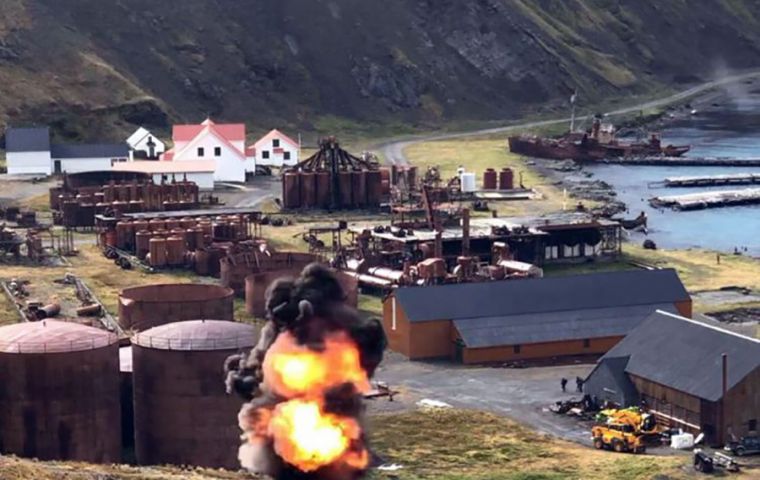MercoPress. South Atlantic News Agency
Royal Navy takes bomb disposal experts to South Georgia to remove Falklands War munitions
 Leftover ordnance from the 1982 conflict is safely detonated above Grytviken (Photo: Royal Navy).
Leftover ordnance from the 1982 conflict is safely detonated above Grytviken (Photo: Royal Navy).  The team found rocket motors and munition that threatened the rich wildlife that inhabit the island.
The team found rocket motors and munition that threatened the rich wildlife that inhabit the island. The Royal Navy's HMS Forth has taken bomb disposal specialists to South Georgia as part of a mission to protect the island's wildlife. The ten-day environmental mission set out to remove bombs and ordnance left behind during the Falkland Islands conflict involving the Argentine armed forces in 1982.
Explosive Ordinance Disposal technicians from the British Army's Royal Logistic Corps were sent to find and deal with historical devices. The remote British territory located in the South Atlantic was the first place occupied by Argentine forces in March 1982 and the first place liberated by British forces the following month.
The HMS Forth replaced the HMS Clyde as the Royal Navy’s new patrol ship and it has made its first appearance in South Georgia a year ago. Back at the begging of 2020, the 2,000-tonne ship arrived in the Falklands as the islands’ new patrol ship. It is HMS Forth’s third visit to the wildlife haven of South Georgia.
The team of bomb disposal specialist was led by Sergeant Bethany Bray and accompanied by Petty Officer 'Cat' Stephens and Able Seaman El-Leigh Neale.
They found rocket motors and munition which could have posed a hazard to the British Antarctic Survey scientists who work there year-round as well as the rich wildlife that inhabit the island.
HMS Forth's Executive Officer, Lieutenant Commander Richard Attwater, said: “The South Atlantic is a truly joint environment and this patrol is proof of that. Engineers, bomb disposal technicians, submariners, chefs, medics, civilians, infantry and sailors have come together to achieve a common goal.”
”This is my second time in South Georgia after 14 years and it remains a career highlight.”
The vessel also fulfilled the task of patrolling the South Georgian waters to ensure fishing vessels adhere to quotas and regulations. South Georgia’s surrounding waters are home to lucrative stocks of Patagonian toothfish, cod icefish and krill – which can only be harvested in specific quantities and at certain times of the year.
Back in 1982, Argentine forces that were occupying the area since the Battle of Grytviken of April 3, were repelled from the island following Operation Paraquet, a naval bombardment of the hills around Grytviken and an assault by Special Forces and Royal Marines to recapture the island after harsh weather conditions.




Top Comments
Disclaimer & comment rules
Read all commentsCommenting for this story is now closed.
If you have a Facebook account, become a fan and comment on our Facebook Page!